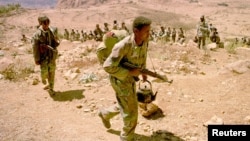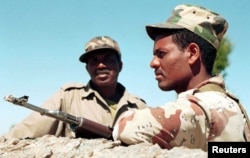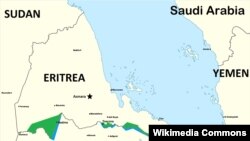The Eritrean Ministry of Information issued a statement Sunday accusing the Ethiopian government of launching a military attack against the country. Ethiopia denies initiating the attack, accusing Eritrean forces of prompting a counterattack by Ethiopia.
The brief statement from the Eritrean Ministry of Information said the attacks occurred on the Tsorona Central Front. Tsorona is a village located near the border, a little over 35 kilometers from Adigrat, an Ethiopian town in the Tigray region.
Ethiopian Communications Minister Getachew Reda said Eritrean forces from around the Tsorona region made unusual, aggressive movements, eliciting a response from the Ethiopian side. He denied it was a significant battle.
“It’s just a skirmish because Eritrea’s side moved in a fashion that is unusual under the circumstances because it’s been a long time since Eritrea’s regular army even ventured outside of their ditches, their trenches,” Reda told VOA, speaking from Germany.
“But this time around," he added, "they launched what appears to be a serious attack, but our forces had launched a counterattack which right now has managed to neutralize the threat emanating from the other side of the border.”
Reda confirmed that Ethiopian authorities have asked civilians to evacuate or seek shelter due to artillery fire. “The Eritrean artillery units are making indiscriminate bombardment of the area so it will be a very responsible move for us to tell some of our people, especially those who are close to the border, to evacuate, not to evacuate in a sense of leaving their village but to a safer area,” he said.
Unilateral aggression alleged
The Eritrean Information Minister Yemane Gebremeskel tweeted that the aggression came from the Ethiopian side and that it should be “condemned unequivocally,” he wrote on his Twitter account. “Bland statements calling on ‘both sides to show restraint’ [are] unwarranted and toothless.”
Eritrea and Ethiopia fought a border war from 1998 to 2000, with significant fighting occurring between the towns of Tsorona and Zalembessa. Thousands died, and animosities continue to this day, with a heavy military buildup along the unmarked border. When the war ended, the international community formed a boundary commission to delimit and demarcate the countries’ shared border. The commission was responsible for issuing a final ruling after hearing each side’s border claims.
Both sides agreed to abide by the 2002 ruling of the Eritrea–Ethiopia Boundary Commission (EEBC), but Ethiopia stonewalled after the border had been defined. The border has never been demarcated, and it remains a source of tension.
The contested town of Badme, the town at the center of the border conflict, was awarded to Eritrea, but Ethiopia continues to occupy the town and Reda confirmed there are sufficient troops stationed there to “thwart any potential attack.”
Mirjam Van Reisen, the director of the Europe External Policy Advisors (EEPA), a Brussels-based group of consultants focusing on EU development policy, said that if the issue is about border demarcation between the two countries, “they have to follow the international agreement, there is no question about that.”
The incident comes in the wake of a June 8 United Nations report accusing Eritrean leaders of committing crimes against humanity.






